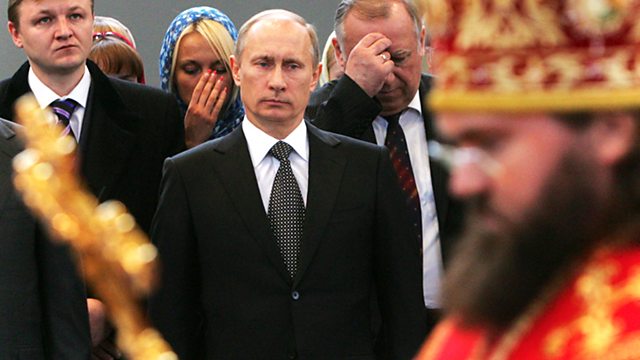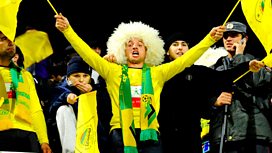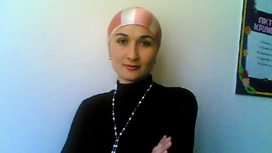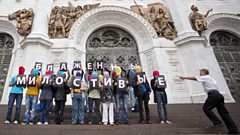Putin, the Patriarch and Pussy Riot
After feminist punk group Pussy Riot sparked outrage in a Moscow Cathedral, Lucy Ash explores the complex relations between church, state and protest in Putin's Russia.
The prison sentences given to three members of the Russian punk band Pussy Riot have been widely criticized in the West. But why did the three young women stage their anti-Putin protest in a cathedral? And why did their'punk prayer arouse such fierce reactions?
The case - which some have called "the defining act of a generation" has underlined the growing militancy of the Russian Orthodox Church in the Putin era. Some say the Church's political influence may be greater today than at any time since the 17th century. The affair has caused a deep rift in society - some say the Church is an anchor of Russian identity; others see it as a formidable impediment to the country's modernisation.
Although church and state are formally separate, the church identifies itself as the heart of Russian national identity. Patriarch Kirill, the head of the church, has made no secret of his strong support for Putin, praising his leadership as "God's miracle" and describing the punk performance as part of an assault by enemy forces. A bill criminalizing "blasphemy" is currently going through the State Duma, Russia's lower house of parliament.
Lucy Ash reports on the complex relationships between Church, state and protest in today's Russia. She begins her investigation by talking to Orthodox monks on an island in northern Russia the middle of Europe's largest freshwater lake. The Valaam Monastery was built in the 14thc as an outpost of Eastern Orthodoxy against the heathens.
President Putin is a frequent guest. This summer he dropped by with his friend, the former Italian PM Silvio Berlusconi. He has also visited in a luxury yacht which later became the property of the monks. There has long been concern about the lavish life styles of some prominent clergy. Many Vallam residents moved there in the Soviet era when the monastery was a hospital. Now some, who have been there much longer than the monks, fear they could soon face eviction from their homes by the Church, which has sought to control all property and the lucrative tourism business in the area.
Recent revelations of the Patriarch's apparent career in the KGB from the 1970s, his luxury watches and yacht, together with the church's successful money-making schemes, all make many priests and followers uneasy.
Lucy then visits St Petersburg, ever since Peter the Great known as Russia's window on the West. Yet the city has recently become the epicentre of a growing assault on the immoral influence of western culture. Vitaly Milonov, head of the legislative committee of the St Petersburg assembly recently passed a law which bans "propagating homosexual propaganda" among minors. As a result, the pop star Madonna is currently facing an $11m law suit for supporting gay rights at a recent concert by a shadowy new group called the Trade Union of Russian Citizens. They are also trying to prevent a modern art exhibition called Icons from opening in the city on the grounds that it is blasphemous. A sexual advice centre for teenagers has also come under fire. One member said: "It took 70 years to free Russia from Communist ideology but thank God it has only taken us two decades to get rid of this Liberalism foisted on us by the West".
Yet Lucy also sees a more liberal side of the Church at a social project run by priests and volunteers to help young criminals on parole in St Petersburg.
And she finds that not all of the Orthodox Church is pleased with the institution's rapprochement with the government. Dissenters within the church, of whom there are many, argue it is a terrible mistake for the Church to allow itself to be manipulated by the Kremlin.
.
Last on
![]()
The Primorsky Partisan
Lucy Ash asks why six young men in Russia's Far East waged a guerrilla war on the police.
![]()
Russia's New Energy Frontier
Lucy Ash visits Russia's Arctic where reindeer herders and gas companies compete for land.
![]()
Roubles and Radicals in Dagestan
Lucy Ash asks if a billionaire's roubles can help to end Dagestan's bloody insurgency.
![]()
Crossing Continents: Chechnya
Lucy Ash investigates the treatment of women in Chechnya.
Clip
-
![]()
Is the Pussy Riot scandal good for Putin?
Duration: 03:00
Broadcast
- Mon 1 Oct 2012 20:00麻豆官网首页入口 Radio 4






